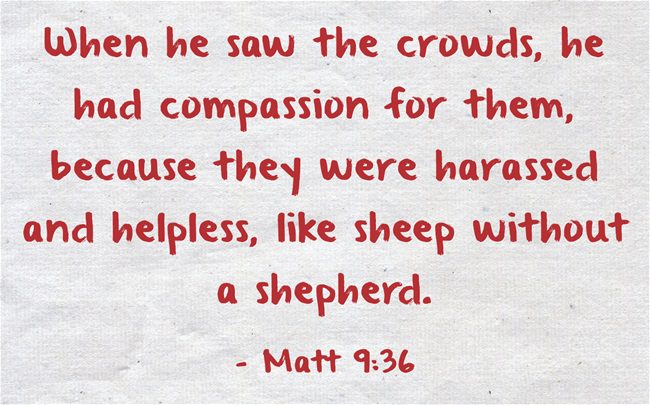Here is a Sunday school lesson or Bible study I hope you can use about compassion.
Compassion
Compassion is a combination of two words, com “with” and passion or “to suffer together,” and so it is with great passion of others, someone could be said to be sharing in their suffering and that’s biblical as Paul writes, “who comforts us in all our affliction, so that we may be able to comfort those who are in any affliction, with the comfort with which we ourselves are comforted by God” (2nd Cor 1:4). The question is, “Have you ever felt compassion for somebody?” Was your response to their suffering a desire to help? Whether its commiseration, condolence, sympathy or any other act or capacity for sharing the painful feelings of another, compassion is indispensable in the Body of Christ, the church.
Have you shared in someone else’s suffering?
Could you call it “to suffer together?”
How are we to comfort others?
Israel’s Compassionless Shepherds
Matthew 9:36 “When he saw the crowds, he had compassion for them, because they were harassed and helpless, like sheep without a shepherd.”
Jesus knew that Jerusalem was a valley of dry bones because the religious leadership had abandoned the Word of God and replaced it with the traditions of men (Mark 7:8) and so Jesus had great compassion for this people and knew they didn’t have a true shepherd. More than once, Jesus would say, “I have compassion on the crowd because they have been with me now three days and have nothing to eat. And I am unwilling to send them away hungry, lest they faint on the way” (Matt 14:14), showing the greatness of this One, True Shepherd in Jesus Christ. He is the Great Shepherd, full of compassion (Psalm 23; Psalm 103) as when “he went ashore he saw a great crowd, and he had compassion on them and healed their sick” (Matt 15:32). When you read Isaiah 49, which says “the Lord has comforted his people and will have compassion on his afflicted” (Isaiah 49:13) you can see how Jesus fulfilled that during His earthly ministry (Matt 14:14, 15:32).
What does the word “afflicted” mean in the context of Isaiah 49:13?
Why were the crowds without a shepherd since they had all those Jewish religious teachers there?
When was a time when you had compassion for someone?
Do you ever have compassion for the lost like Jesus did?
Vindication and Compassion
Deuteronomy 32:36 “For the Lord will vindicate his people and have compassion on his servants, when he sees that their power is gone and there is none remaining, bond or free.”
As we read in the definition of compassion, God was compassionate toward His chosen people and moved to act to help His servants as they had no power in them to free themselves from the bitter bondage of Egyptian slavery. The important thing is that it is “the Lord [Who] will vindicate his people” and not the people themselves. The lesson for us might be to avoid taking the law into our own hands, but more likely for us, to let God deal with it someday as He has promised to do, so we must trust God and do just as Paul wrote, “never avenge yourselves, but leave it to the wrath of God, for it is written, “Vengeance is mine, I will repay, says the Lord” (Rom 12:19).
Does forgiving mean forgetting?
Does this trust in God mean people can do unlawful things to us (Acts 22:27-29)?
Was Israel’s being freed from Egyptian slavery symbolic of something for the new Christian?
The God of Compassion
Psalm 103:13 “As a father shows compassion to his children, so the Lord shows compassion to those who fear him.”
God is merciful to His own children and infinitely more so than any human father and “he knows our frame; he remembers that we are dust” (Psalm 103:14) just as a human father knows that young children are fragile but this compassion of God should extend into our hearts too because “as far as the east is from the west, so far does he remove our transgressions from us” (Psalm 103:12) so why shouldn’t that motivate us to be more compassionate since we’ve been shown such great mercy? The author of Hebrews writes, “For you had compassion on those in prison, and you joyfully accepted the plundering of your property, since you knew that you yourselves had a better possession and an abiding one” (10:34). The Jewish Christians, who are the intended recipients of the Book of Hebrews, wrote this because they had gone through severe persecution; some had lost everything they had and all their source of income but thousands more lost their lives.
Did you have a compassionate parent(s)?
Who do you know that is very compassionate?
Why motivates us to be more compassionate of others?
Conclusion
I urge you in your study to look at all of the Bible verses and read them aloud in the class so that you can get the most out of these lessons. We can’t wrap our minds around God’s compassion “For he says to Moses, “I will have mercy on whom I have mercy, and I will have compassion on whom I have compassion” (Rom 9:15) but if you want God’s compassion on you, you must look to the Man of Passion, Jesus Christ as “all who did receive him, who believed in his name, he gave the right to become children of God who were born, not of blood nor of the will of the flesh nor of the will of man, but of God” (John 1:12-13).
Has your view of compassion changed after this study?
Does it motivate you do be more compassionate to the lost?
What is your definition of compassion?
Article by Jack Wellman
Jack Wellman is Pastor of the Mulvane Brethren Church in Mulvane Kansas. Jack is also the Senior Writer at What Christians Want To Know whose mission is to equip, encourage, and energize Christians and to address questions about the believer’s daily walk with God and the Bible. You can follow Jack on Google Plus or check out his book Teaching Children the Gospel available on Amazon.
















